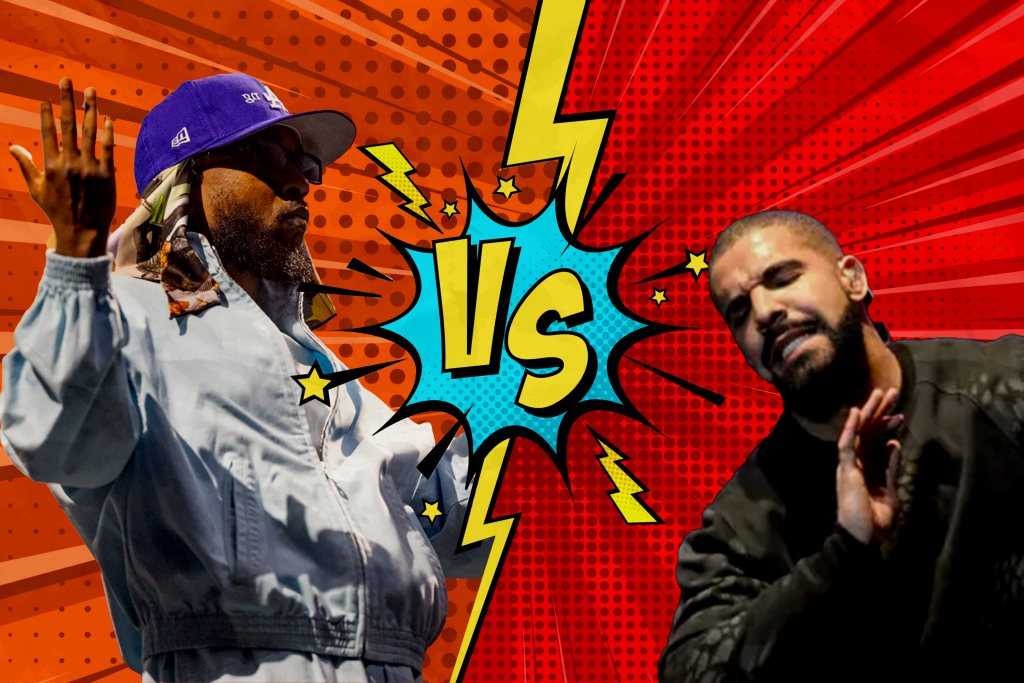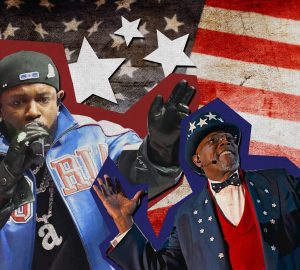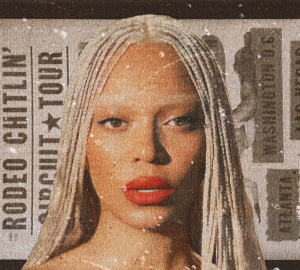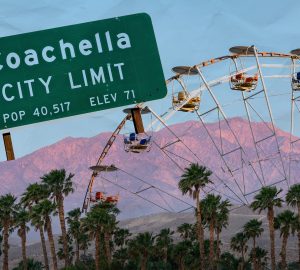Rap Cold War: The history of the Kendrick Lamar and Drake beef

Rap beef has never been hotter. The two brightest stars in the game, Drake and Kendrick Lamar, have gotten into a lyrical sparring match with their singles “Push Ups” and “Euphoria,” which have sent the music community into a frenzy. With some of the barbs thrown between the two, it’s obvious that this beef isn’t surface level, and instead is much more personal. So, it got me curious: What is the history between these two? As someone who grew up watching both artists ascend to fame, there always seemed to be tension between them, but nothing concrete and direct at each other — until now. Or at least, that’s what I thought, until I found out there’s been a cold war between the two for more than a decade.
It all started in 2011. Drake was a rising star in the music industry after his mixtape “So Far Gone,” and his studio debut “Thank Me Later” exploded in popularity with songs like “Best I Ever Had,” “Over,” and “Fancy” climbing the charts. Kendrick was a rising star, but his fame was much more contained to the Los Angeles area. At the time, the two artists weren’t on bad terms. Quite the opposite, as Kendrick Lamar praised Drake in “Determined” on his 2009 mixtape, “The Kendrick Lamar EP.”
“She listenin’ to Drake and all I can say is, “Damn, these niggas that much better than me, baby?”
-Kendrick Lamar on “Determined”
The two met for the first time during Kendrick Lamar’s very first Toronto show back in 2011. After the show, Lamar gave Drake an advance copy of his upcoming album, “Section.80,” and Drake was apparently so impressed that he asked him to be on his next album — which became the highlight of his career to that point — “Take Care.” Kendrick Lamar was featured on the album with the song “Buried Alive Interlude.”
After the release of “Take Care” on November 15, 2011, Drake became a household name. The release of “Section.80” in July of that year also drew much critical praise for Kendrick Lamar, but still not on the same level as his counterpart. Drake tried to help change that by adding him to his “Club Paradise” tour in 2012. Drake even had to fight with his label to get Lamar on the tour, as they wanted Drake to bring along other R&B acts instead. The two continued their friendly working relationship, and Kendrick Lamar featured Drake on his song “Poetic Justice” from Kendrick’s breakthrough and career-defining album, “good kid, m.A.A.d city.” The album was received positively by critics and fans alike, topping many “Best of the Year” lists and selling 242,000 copies in its first week, the most by a male hip-hop artist in 2011. Things were still friendly between the two, as Drake posted a congratulatory tweet aimed at Lamar and the album.
Congratulations to Kendrick. Incredible body of work. Honored to be a part of it.
— Drizzy (@Drake) October 22, 2012
But this is where things begin to shift. Both artists were critically and commercially successful in their fields by the end of 2012. Debates began springing up, trying to decide who was the best rapper in the game at the time. While Drake was topping the charts, Kendrick Lamar was being heralded by critics and rap legends as “The savior of rap.” The two rappers would appear for the last time on a track together at the beginning of 2013 on A$AP Rocky’s “F**kin’ Problems.”
Then, everything changed when Big Sean’s “Control” was released on August 14, 2013. One of the most legendary moments in recent rap history was about to take place. Kendrick Lamar recorded an aggressive challenge toward numerous rap artists such as J. Cole, Tyler The Creator, Mac Miller, A$AP Rocky, and most importantly to this story, Drake.
“I’m usually homeboys with the same niggas I’m rhymin’ with
-Kendrick Lamar on “Control”
But this is hip-hop, and them niggas should know what time it is
And that goes for Jermaine Cole, Big K.R.I.T., Wale
Pusha T, Meek Millz, A$AP Rocky, Drake
Big Sean, Jay Electron’, Tyler, Mac Miller
I got love for you all, but I’m tryna murder you niggas”
The song sent waves throughout the music community. Interviews and response tracks would follow from almost every single artist mentioned. Every artist took the song for what it was, a harmless competitive jab from one of the best rappers in the game. Some of the artists that were called out even felt like it was an honor. That was, everyone except Drake. He would instead take the track personally, saying in an interview on Hot97:
“It just wasn’t real to me. I saw him after that and it was just like love, so it’s like was that real, or was that for the people? Those were harsh words, you can’t just say that and see me like, ‘Yeah, man what’s up,’ pretending like nothing ever happened.”
-Drake in a Hot97 Interview

Drake felt that Kendrick Lamar was fake for releasing the track and then trying to act like things were cool when they met in person a few days later. He’d even go on to say that the track wasn’t as memorable as people were making it out to be. This is when the cold war really begins.
In September 2013, Drake released his third studio album, “Nothing Was The Same,” and it featured the song “The Language.” The opening line of the first verse goes:
“I don’t know why they been lyin’ but your shit is not that inspirin’.”
-Drake on “The Language”
While most listeners saw this as a general, non-specific bar, others heard it as a diss directed toward Kendrick Lamar. The first shot of the cold war had been fired, and it wouldn’t be long before Lamar would fire back. At the 2013 BET Hip Hop Awards, Top Dawg Entertainment, the music label that Kendrick Lamar is signed to, had a cypher. Kendrick Lamar and other notable TDE artists, such as Schoolboy Q and Ab-Soul, came together to spit a few bars for the program. When it was Kendrick Lamar’s turn, he decided it was time to return fire at Drake.
“Yeah, and nothing been the same since they dropped ‘Control’ and tucked a sensitive rapper back in his pajama clothes.”
-Kendrick Lamar at the 2013 BET Awards TDE Cypher

Kendrick Lamar attacked Drake’s sensitivity over the track that wasn’t shared by other artists, while subtly referencing his newest album at the same time. However, when asked if the lyric was aimed at Drake, Lamar said it wasn’t. The beef simmered down for a while, and the only comment we got on it from either artist was Kendrick Lamar saying there wouldn’t ever be a head-to-head between the two because they were “two different kinds of guys.” But that wouldn’t stop Drake from dropping another subtle diss toward Lamar on the track “Used To” from his surprise album “If You’re Reading This It’s Too Late” in 2015.
“They gon’ say your name on them airwaves
-Drake on “Used To”
They gon’ hit you up right after like it’s only rap”
This could be referencing Drake’s feelings toward the “Control” verse and Kendrick Lamar himself, showing that it all was very much still on Drake’s mind. Lamar still had some moves up his sleeve, and he pushed the release date for his newest album “To Pimp A Butterfly” up to March 15 of that year, about a month after Drake’s. Many saw this as Lamar attempting to pit the two against each other in the court of public opinion without even having to drop a diss track. But there might have been a diss on the track “King Kunta” that wouldn’t be realized until a few months later.
“I can dig rappin’ but a rapper with a ghostwriter? What the f**k happened?
-Kendrick Lamar on “King Kunta”
I swore I wouldn’t tell, but most of y’all sharing bars like you got the bottom bunk in a two-man cell.”
Just a few months after this song was released, Drake was exposed by Meek Mill for working with ghostwriters on his music. This hurt the credibility of Drake immensely, and it’s crazy to think that Kendrick Lamar might have known and called it out before anyone else. Drake’s career wasn’t too dampened though, and he had some of his most commercially successful albums of his career in the following years with “What A Time To Be Alive” and “Views.”
The beef became relatively cool for the next few years. Drake tried to squash the beef multiple times, congratulating Kendrick on winning awards or reminiscing on social media about their come-up together. This could be seen as genuine on Drake’s behalf, or a way of saying “Don’t forget who helped make you famous” to Kendrick Lamar and the rest of the world. Drake even showed up in the crowd at one of Lamar’s shows in Toronto in 2022.
That brings us to current times. Metro Boomin and Future released the song “Like That,” turning the temperature up on this beef like we’ve never seen before. “Push Ups” and “Euphoria” are the most direct shots either artist has taken at the other, ever. But don’t think that this was something that sprang from nowhere. This is a battle that is more than a decade in the making. The rap cold war is finally over, and the first nukes have been dropped.



























